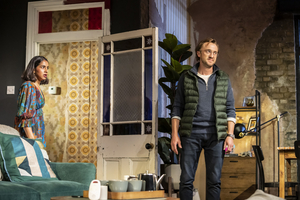Review: 2:22, Criterion Theatre
The supernatural horror starts a new run at the Criterion Theatre with an all-star cast

![]()
Following runs at the Noël Coward and Gielgud Theatres, 2:22 is steadily carving a home for itself in the West End. A new cast including Harry Potter's Tom Felton and Doctor Who's Mandip Gill face 2:22's haunted house with largely gratifying results, until the show's final twist decimates everything the cast have been working towards.
2:22's longevity is partly thanks to playwright Danny Robbin's intelligent use of horror as a needle to thread strands of social commentary together. The real ghost haunting the play is that of gentrification, the erasure of lived experience of working class life in the name of 'progress' as Felton's supercilious Poindexter Sam explains condescendingly to Sam Swainsbury's cockney Ben. The former, clad in a gilet, has moved with his wife Jenny into a Victorian house that they plan to gut and upscale, possibly to the detriment of its former owner who may or may not haunt the place.
But 2:22 is not just a horror story. The basic structure of the narrative is partly reminiscent of Who's Afraid of Virginia Woolf except if Virginia Woolf was an actual ghost; a dinner party deteriorates unravelling the unspoken tensions between its guests. Old anxieties are exhumed. Plates go flying.
Felton is delightfully irritating as Sam, not too smug to be detestable, but nerdy enough to be endearing. With that said, he is unable to fluidly navigate his character's tonal shifts, clunkily clambering from smugness to vexation to fear. Swainsbury is more radiant as the superstitious Ben, stoically turning a blind eye to Sam's middle-class snobbery and giving genuine weight to the possibility of the paranormal.
Mandip Gill shines driving the emotional force of the play as Jenny. Her deeply sympathetic characterisation captures anxieties towards motherhood gracefully. She is anchored by deep affection for her baby daughter and fear of harm coming her way at the hands of a vengeful poltergeist. Alongside Beatriz Romilly's melancholic alcoholic Lauren, the cast establish a solid dynamic.
But for all of Danny Robins' intelligent use of horror tropes to prod and wheedle out social commentary about gentrification and class, everything is totally undermined by the mind-bogglingly crass ending. Without giving too much away, the twist is derivative; fans of horror will recognise it from a well-known film whose twist is so famous that even uttering the film's title will, no doubt, reveal the spoiler in question. But more importantly it is tangential and does nothing to tie up the thematic loose ends that the play had strived to weave together.
2:22 is frightening, but it does not burrow under the skin in the way that genuinely disturbing horror can. The technical direction feels complacent, adding flourishes that do little to exacerbate the atmosphere. Lightning miraculously strikes to underpin dramatic moments in a way that is too conspicuous to have any effect. The worst offender is the wanton use of jump scares to mark the end of each scene. It is a fun gimmick the first time, but it becomes exasperating. The lighting and sound design could ratchet up the fear, if it did not rely on generic effects to extract a quick thrill from its audience.
Most serendipitous of all however are the occasion rumblings from the London underground trains passing though nearby tunnels. Albeit unintentionally, it does add an uncanny ambiance to the proceedings.
2:22 plays at the Criterion Theatre until 4 September
Photo Credit: Johan Persson
Reader Reviews

Videos
